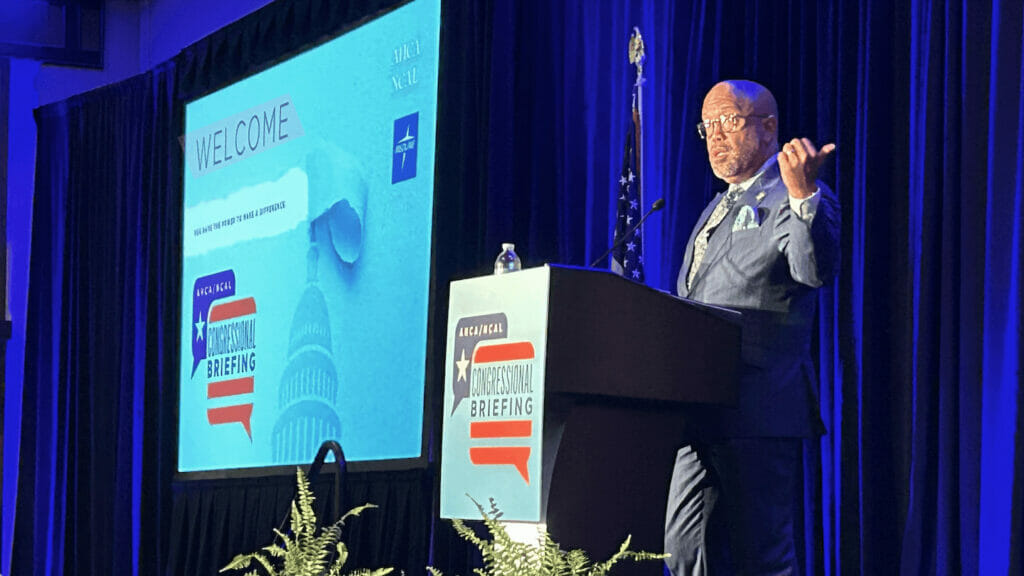
WASHINGTON, DC — A top executive of the largest US nursing home trade association said Tuesday his group is prepared to take legal action if an upcoming federal staffing mandate proves to be overly prescriptive.
More than 500 members of the American Health Care Association/National Center for Assisted Living gathered here this week for meetings with their Congressional representatives. Most were asking for support in making sure the staffing rule, details of which have still not been made public, offers a reasonable chance of compliance.
But should it not, AHCA is gearing up to continue its public awareness campaign and behind-the-scenes efforts to find friendly lawmakers willing to pressure the Centers for Medicare & Medicaid Services on its final regulations. Ultimately, the association also could sue.
“If it’s going to be bad, the question is how bad. I think we’ve shaped the ‘how bad,’ but we’re still going to need to work on fixing it,” said Clif Porter II, senior vice president of government relations for AHCA. He noted lobbying and grassroots efforts that stretch to the Biden administration’s first call for a mandate in early 2022.
AHCA is asking CMS to: consider funding the rule; broadly define which workers count toward the minimum; start the requirement as a demonstration project and then phase it in; delay it until the skilled nursing workforce recovers; and issue ‘reasonable’ waivers in tight labor markets.
The rule’s comment period is the ideal time for providers and members of Congress to weigh in with those types of needs, Porter said. Suing the Centers for Medicare & Medicaid Services could follow as a final tactic if such accommodations are not included, Porter added.
“I hope we don’t have to, but we’re ready if we do,” he said, noting that the AHCA board has already approved such action if it becomes necessary.
While providers hoped to seek legislative solutions to the workforce issue on Capitol Hill, consternation over the timing of the CMS minimum staffing standard was a major theme Monday and Tuesday.
At a press conference held Tuesday as part of the 2023 Congressional Briefing, AHCA President and CEO Mark Parkinson and several providers beseeched lawmakers for solutions that would lead to a pipeline of workers, rather than a punitive measure that might increase burnout among existing workers who would be stretched too thin.

“There are solutions out there. We need help. We need Congress and the administration to coalesce around the sector and provide solutions to our workforce problem,” Parkinson said. “[But] in the face of all these workforce challenges, it’s disconcerting to know that in the next couple of weeks there will be a proposed mandatory minimum staffing requirement from the administration. We’re not against more staff. We want more staff. The problem is the staff are simply not out there.”
AHCA on Tuesday released a new survey of 425 members showing persistent staff shortages and access issues across US nursing homes.
“Our hope is that when the rule comes out it will be reasonable,” Parkinson told McKnight’s Long-Term Care News after the event. “We don’t know what’s in the rule, so we don’t know if that’s the case or not. If the rule is not reasonable, then we hope that members of Congress, both Republican and Democrat, will weigh in during the comment period and help us improve it.”
Parkinson afterward added that he remains optimistic about potential labor solutions passing during this Congress, though some of the bills being backed by the association did not muster enough support for a full vote last session.
“I’m feeling better since the debt ceiling deal,” Parkinson said. “I think it shows it is possible for them to come together. I don’t want to overstate the chances, though.”
Parkinson’s sentiment was foreshadowed earlier Tuesday by House Minority Leader Hakeem Jeffries (D-NY), who called the healthcare workforce issue a “real, acute challenge” that needs a bipartisan solution.
“We of course look forward to … finding the common ground necessary both to deal with the immediate situation administratively and creatively, but also to find long-term solutions,” Jeffries told AHCA members. “Every American family in this great country of ours will ultimately have someone who needs the care that is provided in a nursing home or assisted living. Every single American family is touched by what this industry does, but the work that you do.”



